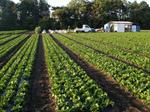Working as a Market Gardener
Market gardeners grow vegetables (and sometimes other plants) for market. Crops are often grown by cultivating soil and forming into long mounded rows (row cropping) and planting seed or seedlings on the raised rows. The lower rows between each mound are used to access the crops. Some crops are planted over a broad acreage (broad-acre crops), without mounds having been formed. Some market gardeners will grow crops in a greenhouse, and some in hydroponic systems (e.g. tomatoes), others may grow more niche crops on smaller properties.
What They Do
A market gardener needs to plant seed and/or plants, fertilise and water the growing plants, inspect the crops progress and respond to any health or other problems that arise (e.g. weeding, pest control, protection from extreme dry, cold, wet, etc.). They need to identify the right time to harvest, then harvest the plant and treat it properly after harvest (e.g. storing at the right temperature). The job can also involve delivering the plant to market, and perhaps sel ling it.
ling it.
- Certain market garden
crops are more suited to broad-acre growing, where soil preparation may
be less involved, and large machinery (often specially designed) can be
used to plant, cultivate and harvest crops on a large scale.
- Smaller scale market gardeners grow crops that are not needed or suited
to growing on a large scale; their work can be less involved with
machinery, and more involved with the plants.
Where They Work
Market gardeners who provide vegetables to a processing plant will need to be growing produce in a location where delivery to the processor is easy. This means transport facilities need to be close to the farm, and ideally the farm should be in the same locality or region as the factory.
Market gardeners who supply fresh produce to market will do best if they can grow close to where the end user lives. The cost of land in urban areas usually prohibits the farm being in an urban area (unless it is very intensive and productive farming), but often they will be located on the fringes of urban centres.
Certain products though, may not be able to be grown where they are needed - due to climatic conditions or because the grower wants a greater sense of control over the growing environment. In these cases, a vegetable might be grown in a greenhouse, or to produce an “out of season crop”. It may be more expensive to get to the user, but it may attract a much higher selling price.
What is Needed
To grow vegetables or other market garden produce you need:
- Broad foundation knowledge of horticulture including soils, nutrition,
water management, weed control, pest and disease management, etc.
- Knowledge of the specific requirements for growing the species or
cultivars you choose to grow and an ability to choose cultivars that are
most productive and that extend the growing season.
- Skills to operate machinery and equipment, and apply safe and productive work practices
• An understanding of harvest and post -harvest handling practices
- If you are to be self-employed you need business and marketing skills.
In the past, market gardeners grew into the job, because it was their
family business. They often learnt on the job from their parents, and
sometimes extended this by undertaking a horticultural course. Today many people entering this field will undertake a course of study that gives them a gorunding in the cultural aspects of growing crops.
Opportunities
Market gardeners often look for seasonal workers to help harvest a crop, or do other jobs at a particular time of year; but might not employ permanent staff. Some larger farms may employ permanent labour, but the level of pay may be minimal. This can provide an opportunity for someone to learn about market gardening though.
Large scale farms, or technologically advanced farming (e.g. hydroponics, aquaponics, greenhouse production, controlled environment mushroom production), can be lucrative business opportunities. There are market gardeners who have become very wealthy; and for the 'smart farmer' opportunities exist, but those opportunities are more likely to be as a self-employed farmer than working for someone else.
Today family farms on the fringes of cities (market gardens
and others) are often sold to developers, and children of farmers move
on to different careers. We still need to eat vegetables though and
increasingly, people who have already had a career elsewhere, but have a
desire to work with plants, may set up new farms in new areas.
More from ACS
Ebook - History, taxonomy, species, cultivars, growing, using capsicums.
View eBook
Ebook - Over 60,000 copies sold: a classic reference.
View eBook
Ebook - Decide what you can produce in your garden and the growing conditions needed for a range of climates.
View eBook
Course - Extremely comprehensive, students graduating from this course alone can set up a herb farm. Covers all aspects in detail.
View Course
Course - for:
Vegetable growers, farm managers, farm workers, breeders, nurserymen, seed breeders and allied service providers.
View Course
Course - For the professional Flower Grower or those starting out - covers all the fundamentals plus many flower varieties.
View Course